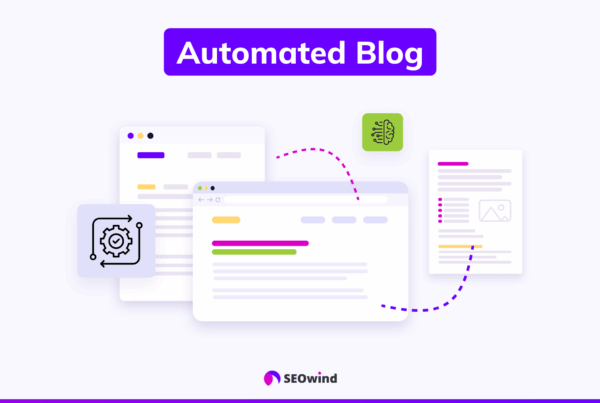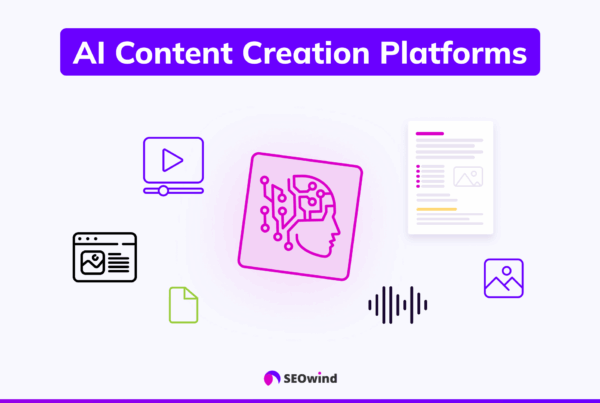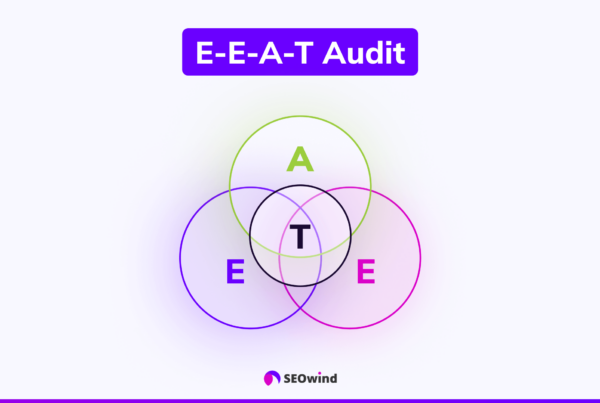The ability to create engaging content is just half of the battle. You also need to be smart about it. Content Intelligence promises to give marketers a competitive edge by utilizing massive data and artificial intelligence (AI) in strategic planning. So, let’s discover this fascinating world where technology meets creativity and explore how content intelligence can potentially skyrocket your marketing success.
What is Content Intelligence?
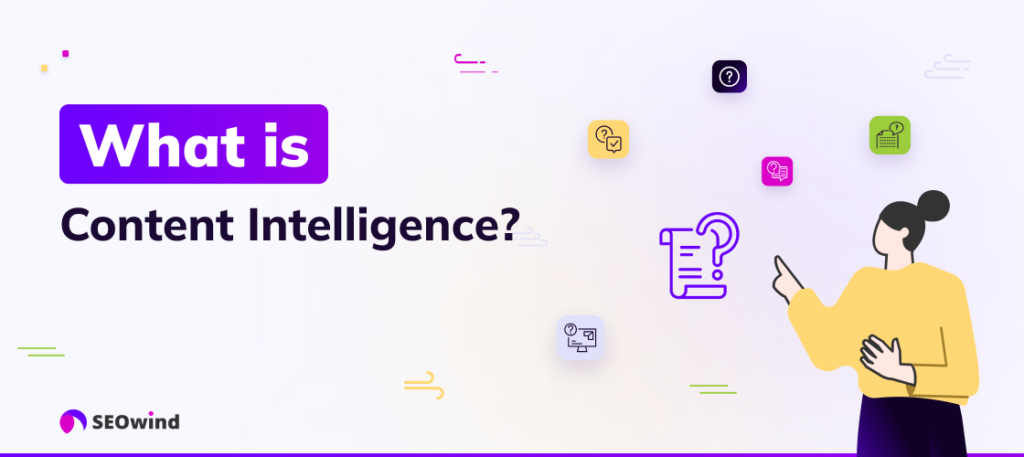
Content intelligence refers to the application of AI technologies and big data analytics to improve one’s content strategy. It involves learning from data to understand what resonates with your target audience, determine ideal posting times, optimize SEO strategies, and much more.
This machine-learning-based approach transforms raw data drawn from user interactions, market trends, and social signals into actionable insights. As soon as these insights are used to strategize content creation and distribution, your business starts leveraging content intelligence.
The ultimate goal? Tailoring every piece of content to be precisely aligned with customer expectations.
Importance of Content Intelligence in Modern Marketing Strategies
A decade back, marketers were limited by instinct and rudimentary analytics while devising campaigns. Today, thanks to advancements like content intelligence systems powered by AI algorithms, a whole new realm of possibilities has opened up.
With a leading-edge tool like this incorporated in their arsenal, marketers:
- Find themselves greatly empowered to understand their audiences better.
- They gain a clearer insight into optimal channels for maximizing engagement.
- Unlock valuable information, helping them craft appealing messages across diverse platforms.
By automating process-intensive tasks and providing real-time analytical outputs, such as sentiment analysis or keyword clustering on vast datasets, decisions become less guesswork-heavy and more robustly backed by scientific findings.
The widely recognized impact of content intelligence can be seen in its growth around the world. The content intelligence market size is estimated to be USD 1.55 billion in 2024 and is expected to reach USD 5.62 billion by 2029, growing at a compound annual growth rate (CAGR) of 29.38% (Mordor Intelligence). North America accounts for the largest market share in the content intelligence market in 2024, while Asia Pacific is estimated to grow at the highest CAGR during the forecast period (2024-2029) (Mordor Intelligence).
How does Content Intelligence work?
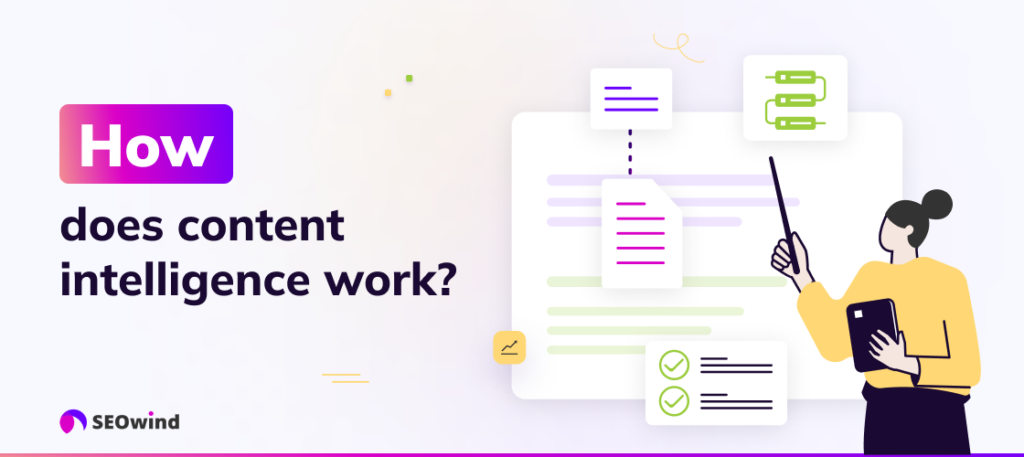
Now that we’ve established its importance, understanding content intelligence’s fundamental principles is crucial to harnessing its potential.
Content intelligence operates through several key steps:
- Data Collection: Initially, systems gather data from across your online platforms – websites, blogs, social media pages, and more. It’s like a bounty hunter on a mission to collect every piece of relevant information available, sifting through an immense amount of digital matter.
- Data Analysis: After data is collected, AI algorithms and predictive modeling techniques interpret raw data setups and patterns. These technological tools manage to identify customer behavior trends or successful marketing strategies.
- Available Insights: Following analysis, insights are provided for review: which type of content engages your audience most? What drives conversion rates? What’s your most efficient marketing channel? These profound insights will arm you with everything you need to strategize effectively.
- Actionable Decisions: Finally, you can use AI-powered analytics results to make actionable decisions that steer business growth by personally catering to consumer needs and market trends.
In essence, content intelligence feels like possessing a crystal ball. It gives marketers previously unheard-of insights into audience patterns and preferences while creating an environment that fosters increased engagement outcomes. If it sounds like magic, brace yourself because we’ve just started exploring its many offerings!
Who can benefit from Content Intelligence?
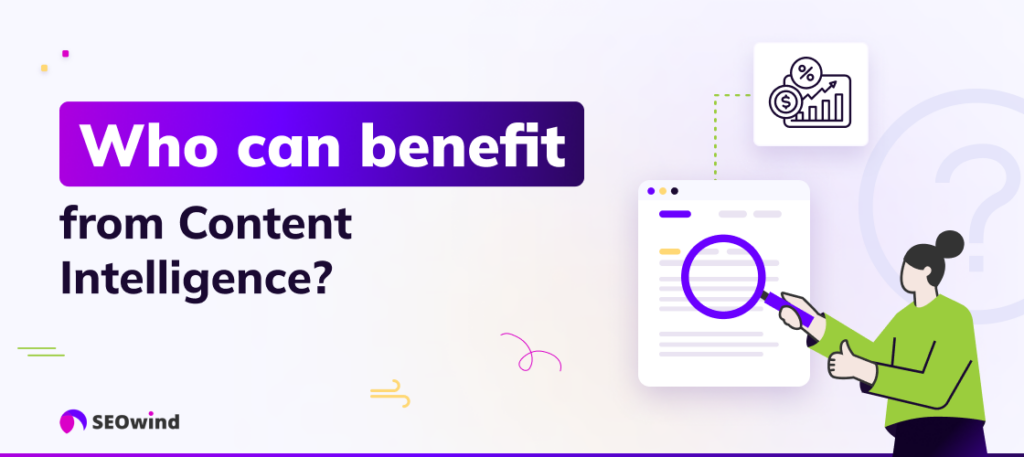
Content intelligence is an extraordinarily versatile tool that isn’t restricted to just one industry or role.
Digital marketers
Digital marketers are among the primary beneficiaries. Content intelligence enhances their understanding of audience preferences and tastes, guiding them in crafting targeted marketing strategies that resonate deeply with their consumers.
Content strategists
Meanwhile, content intelligence provides content strategists with profound insights into trending topics and successful content benchmarks, enabling worthwhile planning and execution of result-driven content campaigns.
Copywriters
Even copywriters can leverage content intelligence tools to enrich their writing by measuring readability scores, keyword relevance, and more. This ensures that they create compelling copy that effectively engages readers.
Business executives
And business executives aren’t left out of these benefits! Gathering invaluable data on performance metrics like engagement rates and return on investment (ROI) helps these decision-makers evaluate campaign success and steer clear business decisions.
Each of these roles gets empowered by using content intelligence to streamline processes and drive strategic agendas, which leads to improved performance metrics. So, anyone involved in conceptualizing, creating, or leveraging online content can benefit from implementing content intelligence in their operational protocols.
Key Benefits of Implementing Content Intelligence
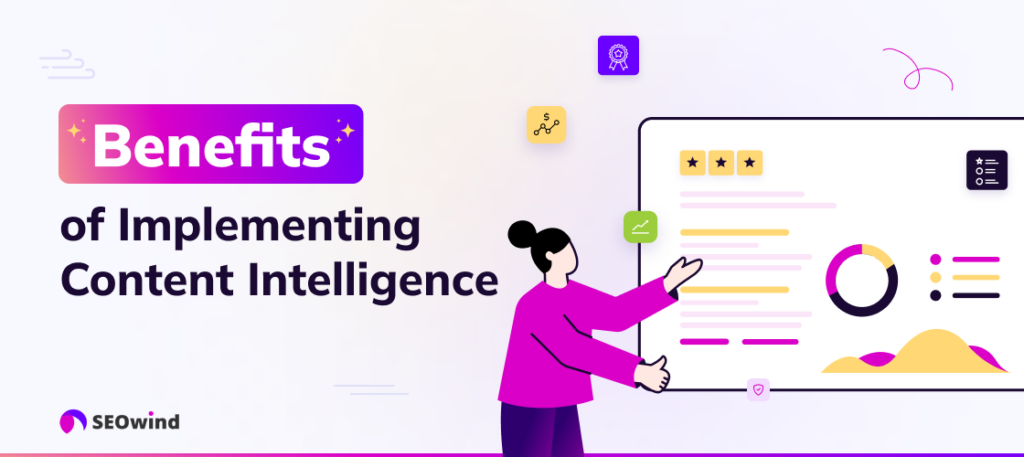
One cannot truly appreciate the value of content intelligence without exploring the vast array of benefits it delivers to businesses worldwide. Let’s explore its key advantages a bit more.
Enhancing Content Relevance and Engagement
Creating relevant content is not a practice solely anchored in stellar writing skills or creativity. It also requires understanding audience needs, preferences, and habits, which is where content intelligence comes into play.
This solution provides pivotal insights into what your target consumers desire, allowing you to adapt every nuanced detail to their tastes. With such valuable knowledge, crafting content that resonates with your audience becomes significantly easier, which boosts interaction rates in the form of more likes, shares, comments, and, ultimately, conversions!
Streamlining Content Creation Processes
In the oceanic expanse of digital marketing, producing high-quality content rapidly and consistently without sacrificing relevance can be severely challenging.
Content intelligence tools help tackle these obstacles by efficiently extracting essential elements from preexisting successful pieces, such as structure or topic trends. This shortens research times and simplifies ideation processes, enabling creatives to work smarter and deliver potent results.
Improving Personalization and Targeting
As we all know, personalization is essential to achieving success with your content. As Jamie Turner put it, “The only way to win at content marketing is for the reader to say, ‘This was written specifically for me.'” (Source: ActiveCampaign)
By harnessing insights about user behaviors, including browsing history, frequently viewed categories, and clicked links, we can craft unique, tailored experiences that speak directly to each specific consumer. This intimate connection delivers gratifying user experiences, paying dividends in the form of increased customer loyalty and click-through rates.
Optimizing Content Performance and Conversion Rates
Content intelligence doesn’t stop at creation and delivery. A pivotal part of its duties includes continuously tracking content performance after publication. It can monitor audience response to understand what’s making a hit or miss.
Perhaps one blog post garnered more views while another was left largely unattended. Understanding why such variations occur is integral to optimizing future efforts, an objective cleanly handled by these tools, resulting in more efficient strategies and better conversion rates over time!
Gaining Insights into Audience Preferences and Behavior
There’s an old saying that knowledge is power—and understanding your audience preferences certainly equates to valuable marketing power.
With continual data collection, you build comprehensive profiles about your audience, including their interests, behaviors, reactions to specific triggers, and more. These detailed blueprints serve as vital footprints guiding the creation of irresistible content attuned to your audience’s interests! Integrating this ability into your strategy ensures long-term connections with regular users, growing your brand authority significantly.
Driving Data-Driven Decision Making
Finally, content intelligence serves as a guide for data-driven decision-making protocols.
Maintaining a gut-feeling approach to decision-making can be perilous. Detailed data analytics provided by content intelligence provide critical input that enables informed decisions, from deciding what type of content will perform best on which platform to analyzing potential market trends. When leveraging AI, these choices can be made faster and more precisely.
Employing content intelligence defines your firm as a thought leader, while others lag behind by using outdated practices!
Choosing the right Content Intelligence Platform
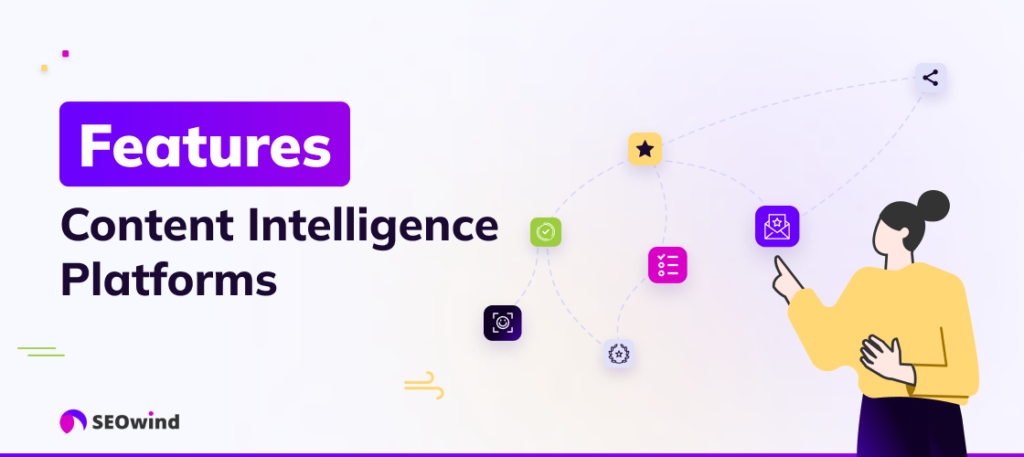
Your journey to higher content marketing effectiveness begins with choosing the right instrument to transform your approach. A robust content intelligence platform is like a compass guiding you through uncharted territories. Though the market boasts countless tools, picking one tailored to your specific needs and objectives can make all the difference.
Understanding Your Specific Needs and Objectives
Before we go through various platforms, it’s crucial to clearly understand your unique requirements.
- Define Your Content Goals: Are you aiming for customer acquisition or increasing brand awareness among potential clients? By first identifying your key objectives, you can ensure the platform aligns with these targets.
- Select Areas Needing Improvement: Do you want more relevant topics, or are you struggling with targeting precision? Maybe both? Your choice should comprehensively address these pain points.
- Consider Your Technical Capabilities: Do you have an experienced team adept at handling complex systems, or do you need something user-friendly and straightforward?
Your ideal solution lies at the intersection of your answers to these questions and what these platforms offer.
Key Features to Seek in a Content Intelligence Platform
When you’re ready to create an edge with content intelligence, you need more than just a random tool. But how do you decide the features that matter the most?
Real-Time Data Collection Capabilities
One of the most critical capabilities for any content intelligence platform is its ability to collect data in real time. Timely and updated information allows marketers to keep up with ever-changing trends, audience interests, and consumption patterns.
A platform that collects real-time data can offer insights into what type of content resonates most with your audience right now. It’s virtually impossible to keep up with changes in audience behaviors manually, so this attribute becomes indispensable.
Automated Processes for Efficient Optimization
In our fast-paced world, efficiency is king. And through automation comes proficiency. An excellent content intelligence tool should automate as many processes as possible – streamlining content execution from start to finish.
Automation within a content intelligence platform could manifest as AI-driven topic suggestions, predictive analytics for campaign performance, or even automated distribution across chosen channels—leaving room for creative minds to work their magic where robots simply can’t.
In-depth Audience and Competitor Analysis Tools
Being able to deep-dive into audience preferences helps craft captivating content. Similarly, competitor analysis tools enable market positioning by identifying unique opportunities and strengths not yet explored on other platforms.
Remember that knowing your users intimately and keeping an eye on competitors’ moves are recipes for successful differentiation!
Seamless Integration with Third-party Applications
Next up on our checklist is seamless integration with other applications you use regularly in your marketing stack, be it CRM tools, email marketing software, or social media platforms.
Having all these apps communicate smoothly creates a unified and efficient workflow, making life much easier. In addition, it will help gather complete data sets for better content optimization down the line.
Effective Content Management System for Enhanced Workflow
Last is an effective content management system (CMS). A CMS stores and organizes your content, facilitates team collaboration, schedules publication, and tracks performance all in one place.
An integrated CMS within a content intelligence tool allows teams to plan, create, distribute, analyze, and essentially manage everything about their content, all while providing insights that enable shrewd decisions.
The mission of a comprehensive content intelligence platform is to simplify complex marketing processes by applying AI’s sheer power. Remember these essential features as you seek out that perfect match.
Top Content Intelligence Tools in 2024
Having established a fundamental understanding of content intelligence, let’s now take a detour into the practical world by examining some dominant tools in the market that have made waves so far into 2024.
SEOwind: In-depth research for content creation
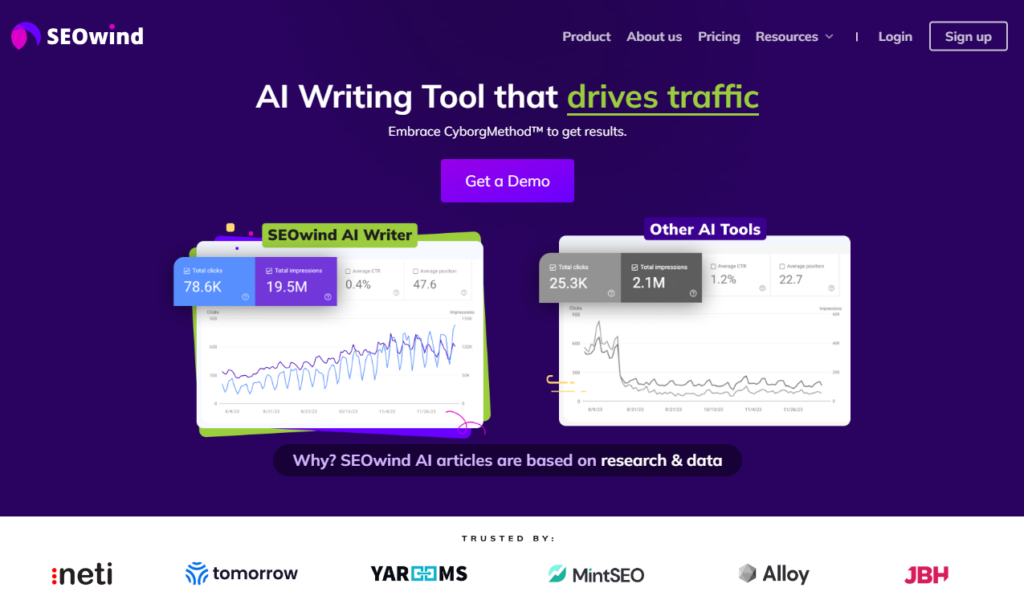
First on our list is SEOwind, a tool known for its advanced research capabilities tailored to impactful content creation. With this solution, you get access to valuable insights on top-performing content for a particular keyword. This way, you know what keywords they are ranking for, what topics they cover, including their content outlines. What’s more you can also get details on user questions.
Contently: Seamless Content Management Solutions
Next, we have Contently, an all-in-one package that streamlines content management from ideation to publishing and even performance tracking. It offers innovative solutions such as collaborative workflows for team projects and advanced scheduling features that balance peak engagement timeframes against other planned activities.
If you’ve been longing to provide relevant, personalized experiences to users or want effective communication between cross-functional teams, Contently might be your best option! Its strength is centralizing everything to eliminate hours spent hopping between different platforms.
ImpactHero: Real-Time Data Insights
Next up is ImpactHero, touted as the superhero among content intelligence tools when it comes to real-time data insights! Whether indexed pages are underperforming or bounce rates seem inexplicably high, ImpactHero doesn’t merely highlight these issues but explains why they’re occurring.
The granularity of information flowing from ImpactHero helps strategists develop a more nuanced understanding of audiences’ reactions to their content offerings, paving the way for more effective strategies.
Semrush Toolkit: Comprehensive Competitive Analysis
Lastly, discuss Semrush Toolkit, your secret weapon for a comprehensive competitive analysis. It provides laser-focused insights into the methods behind your competition’s success, which you can strategically mirror or diverge from to gain an edge.
Moreover, with its robust keyword research functionality alongside backlink analytics, expanding reach while maintaining relevancy becomes less like magic and more about methodology!
Each tool outlined above fulfills different needs in the realm of content intelligence. Your choice should harmonize with immediate business requirements and long-term aspirations. In the next section, we’ll discuss how to successfully infuse content intelligence into marketing firms.
Integrating Content Intelligence into marketing teams
The integration of content intelligence is transforming the digital marketing landscape. Its advanced technology capacities and real-time data analysis capabilities streamline workflow efficiencies, enhance personalization efforts, and ultimately enable companies to succeed.
Streamlining Content Planning and Creation Processes
One area where content intelligence shines is in improving planning and creation processes for marketing teams. It provides insightful solutions to various hurdles that have traditionally impeded content strategizing.
- Time Management: Content intelligence tools expedite research time. They sift through mountains of internet data to provide relevant insights swiftly, freeing up valuable time for strategic planning.
- Content Alignment: These solutions evaluate the alignment between your existing content and target audience behavior patterns to help develop targeted strategies.
- Trend Monitoring: Tracking current trends in your sector becomes effortless with content intelligence, allowing you to weave hot topics into your strategy.
- Inspiration Buckets: These tools fuel inspiration by extracting unique ideas from competitors’ content, setting you ahead of the creative curve.
These features simplify complex decision-making processes while reducing manual labor, ensuring that your planning transitions seamlessly into action.
Analyzing Performance Metrics and Personalizing Experiences
Another area where content intelligence reshapes traditional approaches is by analyzing performance metrics at a granular level. This pivotal task illuminates which elements work exceptionally well and which need revamping.
And beyond basic engagement metrics like clicks or shares, content intelligence performs more thorough user sentiment analysis with AI-powered Natural Language Processing (NLP). Recognizing subtle emotional cues in language gives marketers the opportunity to understand audiences better.
By pinging critical touchpoints in consumer journeys, we can craft personalized experiences designed exclusively for them, thereby enhancing customer trust and fostering lasting brand relationships.
In integrating content intelligence into marketing firms, we streamline internal processes and extend strategic personalization efforts that resonate with our audiences. This balance is a path to more considerable marketing success fortified by evidence-based decision-making.
Measuring Success and ROI through Content Intelligence
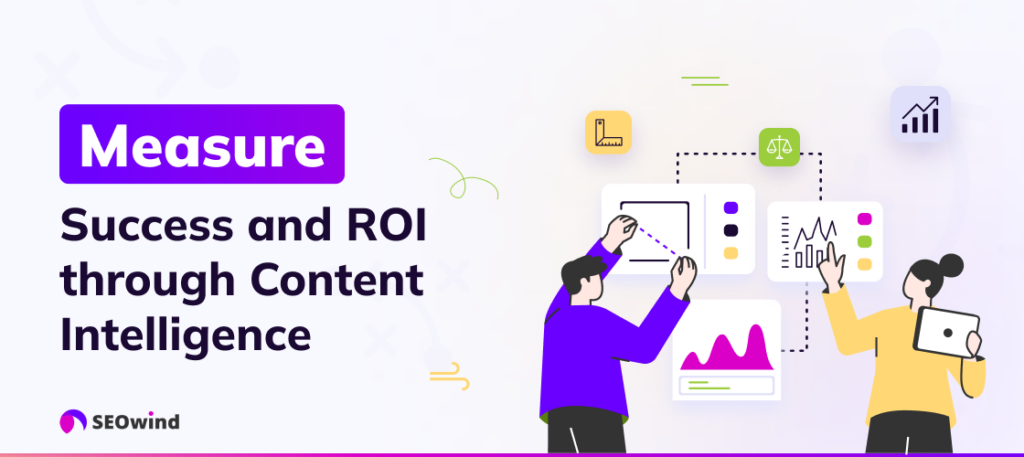
Defining success in content marketing isn’t always straightforward. Unlike traditional advertising, where responses can be more easily measured in terms of sales or new customers, content marketing often works subtly over time to build brand awareness, influence perceptions, and foster customer loyalty. Herein lies the critical role that content intelligence plays: it offers concrete strategies for tracking your efforts’ results.
Tracking Performance Metrics and KPIs Effectively
To understand the success of our content strategy, we must effectively track performance metrics and Key Performance Indicators (KPIs). Content intelligence provides granular insights into how consumers engage with your content across various channels and platforms. It helps track vital KPIs such as dwell time, bounce rate, social media engagement rates, click-through ratios (CTR), and conversion rates.
What’s crucial here is not just collecting these data points but also interpreting them meaningfully. For instance,
- Does a low bounce rate imply that visitors find your site engaging?
- What did they do after reading your blog post?
- Did an eBook download lead to further actions?
Answers to such precise questions empower marketers to continually tweak their strategies for enhanced efficacy.
Demonstrating Tangible Returns on Investment
Although understanding performance metrics is pivotal in content marketing strategies, demonstrating a tangible ROI is equally essential. When discussing ROI in a business sense, it conventionally refers to financial gains. However, content ROI may take numerous forms based on predetermined goals.
Content intelligence encourages us to dig deeper into behavioral cues from our audience profiles, which derive from continuous interactions with our content. Subtler achievements like increases in organic website traffic are identified and acknowledged alongside typical financial indicators.
By leveraging powerful AI algorithms associated with effective analytics tools such as Google Analytics or Adobe Experience Cloud, content intelligence can clarify conversion pathways and demonstrate tangible ROI.
Therefore, as experienced marketers operating in an increasingly digital economic landscape, let’s strive to incorporate these content intelligence benefits into our repertoire. Doing so will allow us to design, curate, and deliver maximally impactful content that brings considerable value for all parties involved.
The future of Content Intelligence in transforming marketing efforts
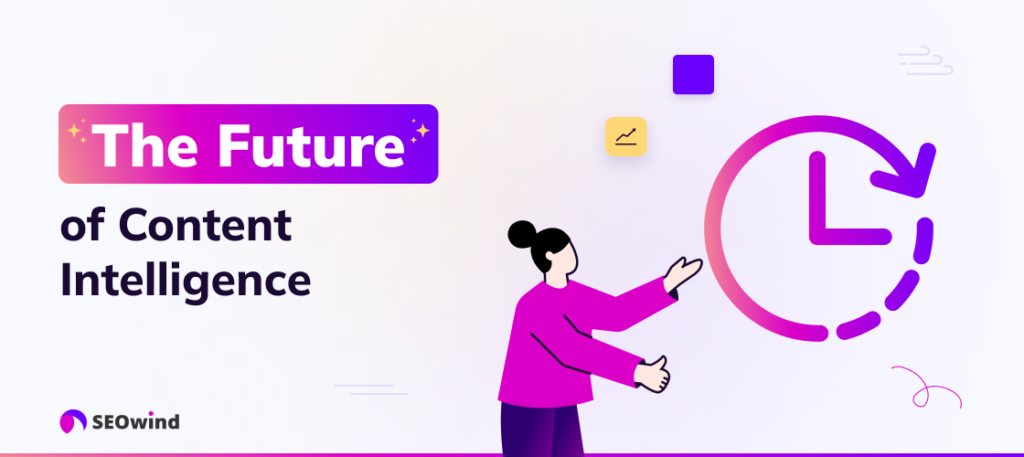
The impact and effectiveness of content intelligence on marketing strategies cannot be overstated. As we navigate this digital era in which data reigns supreme, leveraging AI-based tools to make more informed decisions has become utterly vital. Indeed, the future of successful marketing campaigns seems intrinsically linked to how well organizations adapt and incorporate content intelligence into their strategies.
Already, we’re witnessing a shift from a generalized “one size fits all” content approach to a more personalized, customer-centric outlook. This transformation is largely attributed to the insights unearthed via thorough content analysis using sophisticated AI algorithms. With tremendous potential for growth and evolution, content intelligence seems poised to revolutionize conventional marketing paradigms.
In fact, prediction models suggest an exponential increase in investment into developing even better AI tools specifically designed for content intelligence applications. This indicates that organizations are realizing the importance and benefits of this versatile technology.
What’s more exciting is what lies beyond our current horizon. Envision a virtual assistant capable of creating high-quality content tailored specifically for individual consumers. This is becoming possible thanks to advancements in AI and machine learning technologies.
However, as an authority on this topic, I should also mention the industry’s challenges. Key among them are matters concerning privacy rights and the ethical handling of collected user data. Balancing commercial interests with these aspects represents a crucial hurdle to achieving broad user acceptance.
Content intelligence isn’t just another short-lived buzzword. Instead, it is an exciting reality shaping advanced marketing strategies for our brave new world. Will you partake in this transformative journey? The choice, dear reader, is entirely yours.
